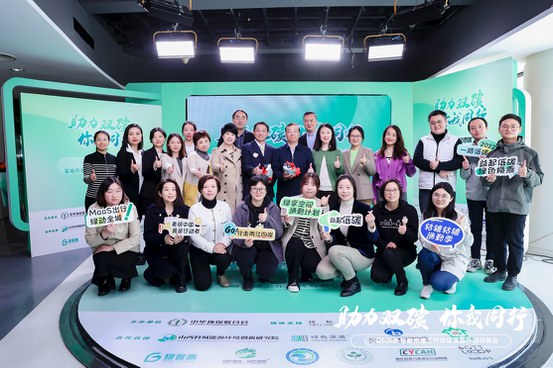“Low Carbon Together” Communications Workshop Emphasizes NGO Participation
On March 27, 2023, a “Low Carbon Together” strategic communications workshop was held in Beijing with the support of Energy Foundation China. The event was focused on what new models are for non-governmental organizations (NGOs) to participate in the communications of China’s carbon peaking and neutrality topics, and on how funders and platforms can better support those NGOs. The event also introduced a funding scheme to the broader domestic civil society audience. Prominent guests of the workshop included Yan Shidong, Deputy Director-General of the Center for Environmental Education and Communications; Zheng Qingbao, Deputy Secretary-General of the All-China Environment Federation; Zou Ji, CEO and President of Energy Foundation China; and Jing Hui, Senior Program Director of the Strategic Communications Program of Energy Foundation China.

Two dozen NGO representatives attend the “Low Carbon Together” strategic communications workshop on March 27, 2023. Photo by the All-China Environment Federation
In his speech, Yan Shidong said that to achieve carbon peaking and neutrality is a profound and systematic socio-economic reform that requires a modern environmental oversight system featuring the leadership of the government, as well as the participation of enterprises, NGOs, and the public, and action of all people.
In his keynote speech, Zheng Qingbao said that enhancing the participation of NGOs in carbon work needs a better ecosystem to provide professional help, systematic communications strategy guidance, and continued financial support—elements that can enable an effective mobilization of the whole society.
In his online speech, Zou Ji pointed out that, reaching innumerable households, climate communications need to build a bridge between policymakers and the public, and among stakeholders. He believed such a bridge is a necessity for accomplishing China’s carbon peaking and neutrality goals. Communicators should put their training into practice and effectively communicate the insights of front-line workers, practitioners, and researchers, he said.

Zou Ji, CEO and President of Energy Foundation China, addresses the communications workshop. Photo by the All-China Environment Federation
Jing Hui said that NGOs play a unique role in the communications and public participation of China’s carbon goals. The spirit of volunteerism featured by NGOs can help bring the public on board and enhance their enthusiasm to participate in climate action, she said.

Jing Hui, Senior Program Director of the Strategic Communications Program of Energy Foundation China, speaks at the workshop. Photo by the All-China Environment Federation
During the roundtable discussion, representatives from NGOs shared their thoughts on how to enhance the sustainability and effectiveness of NGOs’ capacity building in communications. He Miao, Communications Director of Beijing Friends of Nature Foundation, introduced her organization’s Linglong Project as an example. She believed that NGOs’ greater contribution to China’s carbon goals requires professional knowledge—not merely awareness or common sense, but more importantly the establishment of a framework, mastery of methodology, and professional project management capability. Regarding the ideas, experience, learning, and vision on how NGOs can participate in climate communications and find the entry point, other representatives shared their projects, including BOTTLOOP’s project of “100 People Influencing 1 Million+ People’s Green Life Check-in,” Shanxi Coshare Innovation Institute of Energy and Environment’s project of “Cycling for Commuting,” and Green Hunan’s project of “Green Interchange in Metro Stations in Suburban Changsha.” All of them were cases under the funding scheme of “Low Carbon Together.”

NGO guests share their cases at the communications workshop. Photo by the All-China Environment Federation
Jointly initiated in 2020 by the All-China Environment Federation and Energy Foundation China, the “Low Carbon Together” strategic communications scheme offers small grants to NGOs for their greater participation in carbon topics and enhanced capacity for the communications of these topics. In 2023, the third phase of the funding scheme plans to fund five to six projects on the theme of low carbon mobility, in an effort to provide civil society solutions for how to promote decarbonized public transport.




